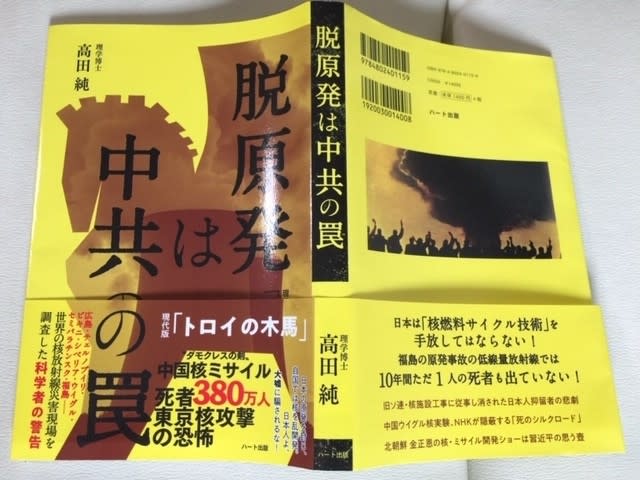The following book is one of the most important and most excellent books of the 21st century.
The author, Jun Takada, is a real scholar of medical physics and nuclear radiation protection.
Every Japanese citizen must subscribe to it now.
I will do my best to make the rest of the world aware of it.
Preface: Smash the Trojan Horse!
The following is a continuation of the previous chapter.
The Occupation Constitution and the Nuclear Regulatory Commission as Flaws in Japan
In Japan, which is still under the MacArthur occupation constitution, unable to amend the Constitution, and steeped in a masochistic view of history, the Trojan Horse sent by the Chinese Communists is operating freely and unhindered.
For years, Japan-China friendship has been cried out, and families flock to Ueno Park to see the cute pandas.
Japan, which has studied ancient China, has unguardedly embraced the Confucius Institute, a base for spying.
In Hokkaido, which is tilted toward the left wing, many Chinese people come to the island under the guise of tourism.
In the midst of this, a vast area of land has been acquired by the Chinese capital.
The area is comparable to Shizuoka Prefecture.
A residential area for Chinese people has been built on the land adjacent to the Self-Defense Forces base in Chitose is indeed not good.
The Wuhan coronavirus spread in Hokkaido, which hosted Chinese tourists for the 2020 Snow Festival.
The governor of Hokkaido is heavily responsible for this.
It is the "wooden horse" of Hokkaido.
In Japan, anti-social activities have been prominent in recent years, such as the shutdown of all nuclear power plants to destabilize electric power, the decision to decommission the fast-breeder reactor Monju for research purposes, the blocking of the geological disposal of vitrified materials, the blocking of the promotion of the nuclear fuel cycle, the blockade of the revision of the occupation constitution, the opposition to the Anti-Spying Law, the Science Council of Japan which obstructs the development of national defense technology while working with the communist state which is pushing for military expansion, and the Japanese Communist Party which manipulates it, and activities against moral education.
Nevertheless, the multiple news organizations have become Trojan horses to see them as mere differences of opinion.
It is the most significant risk in Japan.
The criteria for detecting a Trojan horse are clear.
In my opinion, it is the national interest, national defense, progress, freedom and democratic principles, and Japanese tradition.
The pride of being the world's oldest and only advanced nation, handed down against the backdrop of the Jomon Era that began 16,000 years ago, is a crucial criterion.
Japan has contributed to world peace from time immemorial, and its contribution through science and technology is particularly significant today.
The spirit of Japanese civilization is harmony, the power of harmony united by truth and justice. ("Proudly Japanese Civilization")
Japan's Nuclear Regulatory Commission has suspended all nuclear power plants and created new regulatory standards, which came into effect on July 8, 2013.
To meet these standards, improvement works requiring huge funds are needed.
Based on this, the review process for restarting operations has begun.
It is a fact that no one died in the radiation accident at TEPCO's Fukushima light water reactor power plant.
It is not necessarily TEPCO's fault that the reactors lost power, lost cooling, and overheated, but it could not restore the cooling function.
It is the responsibility of Prime Minister Naoto Kan, who is the head of the national disaster countermeasures headquarters as stipulated in the Nuclear Emergency Special Measures Law.
I have discussed his ineptitude and outbursts. ("Fukushima: Lies and Truth," "The Definitive Fukushima Radiation Health Survey")
Of the 60 reactors that existed before the disaster, only nine had been approved for the restart as of November 2020.
Moreover, only one reactor was currently in operation (compared to three as of January 2021).
It is this excessive regulation of the peaceful use of nuclear power.
The existence of the Regulatory Commission, which has not noticed the abnormality, is too much of a mystery.
Not only will this harm the Japanese economy, but it will also exhaust the local economies of the prefectures where the nuclear power plants are located.
It is a giant Trojan horse in Japan.
The Nuclear Regulatory Commission is a giant robot wooden horse that continues to destroy its own country.
The public is unaware of the risk of not being able to control this anti-Japanese regulatory board.
It was Professor Emeritus Yatsuhiro Nakagawa of Tsukuba University who first pointed out this problem. ("Zero Nuclear Power Plants Will Destroy Japan")
Shunichi Tanaka, the first chairman of the Nuclear Regulation Authority of Japan (NRA), presented a paper, "Where is Japan's Nuclear Power Plants Going," at the 2020 fall meeting of the Atomic Energy Society of Japan.
The Nuclear Regulation Authority (NRA), a three-judge panel suddenly created by the former Democratic Party of Japan (DPJ) government in the nuclear power village, is a powerful body that can exercise its authority independently, without direction or supervision from ministers or other officials.
The first chairman of the commission, Mr. Tanaka, who the Prime Minister appointed at the time, expressed his true negative feelings about nuclear energy technology development. should monitor
As a scholar who firmly believes that the runaway should monitor the Nuclear Regulation Authority, I was surprised to read the article by the first chairman, Mr. Tanaka.
In his article, I found the reason for the long delay in reviewing applications to restart nuclear power plants in Japan and the large number of nuclear facilities that have been decommissioned.
The chairman of the Nuclear Regulation Authority of Japan (NRA) had a "regulation-first approach" to the peaceful use of nuclear energy and a "thought against the development of nuclear fuel cycle technology" in the first place.
It brought Mr. Tanaka's personal feelings to the fore in his article.
He does not even think about solving the energy problems of Japan and the world.
His comments do not sound like an expert who has been in the field for many years.
I am a scientist outside the nuclear power industry, but I strongly wish to maintain and develop Japanese civilization through atomic power.
I love Japan.
I am convinced that the development of nuclear fuel cycle technology is a crucial issue for humanity.
The following is a critique of Mr. Tanaka's main points. (For the complete text, please refer to "Discussion on Paper" on the Internet at http://rpic.jp)
Mr. Tanaka says that the nuclear fuel cycle, which the major power companies have promoted and the Ministry of Economy, Trade, and Industry (METI) since its inception, "has not reached the level of the practical application of any of the technologies, even after spending huge amounts of money for half a century."
Still, there is no fundamental problem with the technologies themselves.
The excessive brakes applied by the current regulatory commission, the long years of consensus building in the prefectures where the plants are located, the years of campaigns and lawsuits filed by the opponents, the tremendous amount of time spent in Japan on matters other the original technology.
The chairman of the regulatory commission must be aware of this fact.
In addition, much of the budget for developing these new technologies come from the Special Account for Electricity Supply, which is funded by electricity sales.
The annual sales of electricity are about 21 trillion yen, and if 2% of that is allocated to research and development of the nuclear energy cycle, the yearly amount is 400 billion yen.
It is only natural that 2% of the electricity bill should be used to research and develop essential energy sources for the nation in the future.
The efforts of the private sector are doing this.
It is unreasonable to criticize them.
Mr. Tanaka said, "The accident at 1F exposed the fiction of the 'safety myth' that had been repeated mainly by nuclear power plant operators and destroyed the trust of the public and society in atomic safety regulations. Under these circumstances, the Nuclear Regulation Authority was established in September 2012, and the so-called new regulatory standards came into effect in July of the following year. Shifting all responsibility to the private sector, saying, "The new regulatory standards require operators to take measures to prevent serious accidents caused by all possible factors, including various natural threats, terrorism, and human error, as well as to prevent the spread of accidents.
TEPCO is not responsible for the hydrogen explosion accident.
The leading cause was the lack of emergency response by the national nuclear emergency response headquarters, which was a critical failure.
The biggest failure was the failure to use the Self-Defense Forces to airlift emergency power sources and emergency pumps to the Fukushima Daiichi Nuclear Power Plant, which had lost its core cooling function.
Only the government's Disaster Countermeasures Headquarters could have done this in an instant.
This operation is not that difficult.
If only it had been carried out, the core meltdown could have been prevented, and the hydrogen explosion would not have occurred.
If you look at the minutes of the government's response, it is obvious how negligent it was.
It can say that this is a natural outcome of a government that lacks a sense of national security.
It took 3 hours and 21 minutes from the time TEPCO notified the government under the Act on Special Measures Concerning Nuclear Emergency Preparedness. Prime Minister Naoto Kan issued a declaration of a nuclear emergency at the Fukushima Daiichi Nuclear Power Station.
At that point, the Headquarters knew that the core cooling power supply had been lost and that the core meltdown would start after 8 hours.
The "Summary of Proceedings of the First Nuclear Emergency Response Headquarters Meeting" records that U.S. Ambassador to Japan John V. Roos offered to provide the U.S. military with an emergency generator.
Even in the case of the Fukushima LWR incident, if the Accident Response Headquarters had been functioning correctly, the Self-Defense Forces would have been able to airlift emergency power sources and pumps to the site and restore the cooling function in a short time.
The failure to take such action was a blunder on the part of the Democratic Party of Japan's government of the day.
It is precise because nuclear energy is an essential source of power for the nation that the government must maintain the safety of nuclear power plants.
That is why the Nuclear Accident Compensation Law was enacted.
The leading cause of the Fukushima light water reactor incident, which resulted in a hydrogen explosion, was the failure of the government to perform this function.
Isn't it a serious flaw for the regulatory commission to turn a blind eye to this and demand that the power companies avoid risk by simply improving their technology?
If this situation continues, the nation will not cope with unexpected events that may occur at nuclear energy facilities.
The same is true for national defense.
The government has the responsibility to protect the lives and property of its citizens.
When an enemy nation launches a ballistic missile, it is meaningless to confront them with Article 9 of the Constitution.
The government cannot shift the blame to the civilian population and say that they should be careful because missiles are flying at them.
In any emergency, the responsibility of the government is critical, and it must take the lead.
The Nuclear Accident and Disaster Management Act is also a law that stipulates the responsibility of the government.
The words and actions of the government and the first regulatory commission at that time were ridiculous.
I have been called a "government scientist" and threatened with death by nuclear abolitionists.
The same goes for the terrorist who threw a Molotov cocktail into the house of the mayor of Suto Town, Hokkaido, who was involved in a literature survey on vitrified waste disposal.
The forces trying to rob Japan of nuclear energy technology are the dangerous "Trojan horses."
As a nation, Japan needs to strike a reasonable balance between "promotion" and "regulation" of nuclear energy technology.
Japan has not set "regulation first" as the axis of its national policy.
The government should exercise its power to monitor and correct excessive "regulation of nuclear power.
It is my conclusion after reading Tanaka's article.















